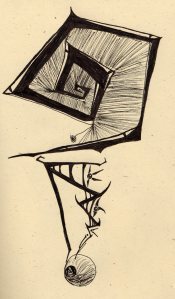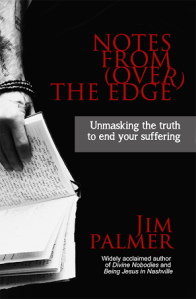Jim Palmer's Blog, page 42
January 27, 2014
Jim, I want to grow and deepen my spirituality, what must I do?
“Jim, I want to grow and deepen my spirituality, what must I do?”
“Give up the notion of separation, and give it up entirely.”
“What do you mean?”
“Quit imagining that you and God are separate, that you and I are separate, that you and all others are separate, that you and life are separate, that you and the mountains are separate, that you and the moon and stars are separate. Give up the notion that you and love are separate, that you and worth are separate, that you and peace are separate, that you and freedom are separate, that you and well-being are separate, that you and happiness are separate.”
“How will I know I have attained this?”
“You will know when you see yourself as a part of the whole, rather than merely an individual and separate entity. You will know when you no longer look at the world through eyes of judgment, but through eyes of love and compassion. You will know when all people and all living things are your family – your mother and father, son and daughter, sister and brother.”


January 26, 2014
Adding Jesus to your life won’t help you (but his truth will)

“Jesus offered freedom but everywhere Christians are in chains.
It is because they were falsely led to believe that by adding Jesus to their lives by saying the “sinner’s prayer,” or “accepting Jesus as their savior,” or “becoming born again,” etc… that life would be complete. This is magical thinking. Jesus never said that he would save or free anyone. He did not say, “I will set you free.” His exact words were, “When you know the truth, the truth will set you free.” What sets you free? THE TRUTH.
Jesus never caused anyone to be saved. First off, you don’t need to be saved – not from God, not from yourself, not from sin. You do, however, need to cast aside your spiritual ignorance. But even this Jesus cannot do for you. It’s not something anyone can do for anyone else.
The idea of conversion transformation is yet another example of magical thinking that is pinned on Jesus. The idea is that if you “accept Jesus as your savior,” “get saved,” or become “born again,” then everything will instantly be fixed in your life. Jesus never said this. You couldn’t get any closer to Jesus than his first disciples and they were clueless half the time. Why? Because they would not accept, embrace, or walk in the reality of the truth Jesus taught and demonstrated. It’s the same then as it is now – you must embrace the truth in order to be free. There is no substitute for that – not even the nice-sounding Christian formulas.
In essence Jesus said, “I know the Truth, and the tools to end your suffering. Follow me.” And if people had a willing and earnest desire, and listened and applied the Truth that was given, transformation happened. Jesus came around and offered, “If you need that bolt loosened, here’s the wrench.” You can’t throw the kitchen sink at a problem and expect it to be fixed. You have to use the right tool to fix a specific problem.
We have a tendency to be offered a wrench to solve a problem, and we make a religion out of the wrench and worship it, and fight over who has the best wrench. In other words, we make it about the wrench rather than the problem for which the wrench was offered. Rather than worshiping the wrench, and wasting time and energy arguing it, simply use it for the problem it was given to solve. You are suffering. There is a tool to fix it.
Adding God or Jesus into your life isn’t going to necessarily solve anything. You’re going to have to apply the Truth and use the wrench.”
- Jim Palmer, Notes from (Over) the Edge: Unmasking the Truth to End Your Suffering


Is hell a burning in our soul?
Question: “Jim, do you believe if people deny Jesus, that they won’t see the kingdom of heaven? I’ve always thought of hell as a separation from God, a burning in our soul. I was once told that the kingdom of heaven lies within our heart. I like that.”
My response: “I think your thoughts make a lot of sense. On the one hand, no human being would be here at all if it weren’t for being born out of the image, likeness, and being of God. God’s being is the ground of your being. God’s being is the ground of all being. So in that sense, separation from God isn’t even possible. However, there is a way that we experience this separation in our ignorance, and in our denial of the truth. Perhaps this is the “burning in our soul” you are referring to. The truth that Jesus lived and taught is truth that sets us free, and truth that opens our hearts and lives to the present reality of God’s kingdom of true peace and well-being. If by default or choice we refuse truth or remain in our ignorance, it only stands to reason that we will suffer great inner anguish. The cause of our present suffering is our ignorance. Jesus said, “If the eyes are good, the whole body is good.” In other words, once you see things as they truly are, your suffering is alleviated, and you experience the present reality of God’s kingdom.”


January 25, 2014
Parsing out the present moment
It is true that our human journey unfolds in time and space, and therefore we will always live inside the reality of a “future,” which means we will always be pursuing various goals and aims in life. However, do not think of the present moment as a means to an end. There is a reality and dimension that is not bound by time or space, which is every bit as real as what happens in time and space. Consider that each moment is an end in itself, and not merely a means to arrive at the end projected in the future. The present is not just a step toward a future goal. What is beyond time and space, such as the kingdom of God, is fully present and intact in every moment. It is not something to achieve and attain. And yet at the same time we are expressions of this kingdom in time and space. All of this is happening at once in each moment of our human journey.
(Photo by Darla Winn)


You have to be human AND divine
“Jesus spoke of being “in this world but not of this world.” Those two prepositions are the key to enlightened, awakened, and transformed living. You are IN this world – yes, you have a body, mind, and personality, and you are consciously directing these as an individual human being. And yet, it is not wise to get too attached to this idea abut yourself. Because it is also true that you are not OF this world. Your true Self is beyond time and space. Your true self is part of a whole. Your true self is the underlying, unchanging, fundamental nature of all things. Your true self is not an independent and separate entity. When you and I are touching this “not of this world” dimension we discover we are one with God, others, and all things. This was the message of Jesus’ life. We are human and divine, and the two are not in opposition to each other. This is the spiritual wisdom that must direct our lives. This is the wisdom that sets us free. All suffering in our lives and in this world is a result of failing to see and embrace this.”
- Jim Palmer, Notes from (Over) the Edge


January 23, 2014
The path to truth is paved with a bunch of hard questions
One of the ways religion stunts a person’s spiritual development is scaring them away from asking questions. Too often, people who “question things” are viewed as agitators, or those who lack faith. Socrates wrote, “One good question can be more instructive than a thousand answers.” Pay attention to the questions that linger in your gut, especially those that relate to things you’ve been told should never be questioned. You won’t get far into spiritual truth without being a questioner. You won’t find true peace, freedom, and well-being without vigorously pressing into the questions you carry deep inside of you.


January 22, 2014
The myth of “us” and “them”
“Dear Jim,
I’ve got this problem. How do you balance and live in the tension of relationships with fellow Christians, and yet being focused on non-Christians?
Sincerely, Tired Tony”
***
Dear Tired Tony,
I’m thinking you might have become a victim fo the “us” and “them” mentality, in this case, “Christian” and “non-Christian.” You might be surprised to learn that such labels were rarely if ever used in the Bible. Even the label “Christian” was originally born out of a derogatory reference people used to identify Christ followers, making fun of how they imitated Jesus.
Tony, who really is a “Christian?” Is it someone who has all the proper “Christian” theological answers? And who’s to say what those are exactly? I’m sure you’ve noticed that there are many different interpretations of the scriptures, each person claiming their view is correct. But even if someone could claim having correct Christian theology, what if that person’s life didn’t resemble anything like the life Jesus lived? Would that person be a “Christian?” And what about a person with an intellectual or learning disability? Can they be a “Christian?” Is a “Christian” someone who prayed the “Jesus prayer”? And what if their motivation for doing so was to make their girlfriend happy?
And Tony, who is the “non-Christian?” As far as i know, every human being deep down desires the abundant life Jesus spoke of – a life of love, peace, freedom, and contentment. Also, every human being (consciously or unconsciously) is seeking that life one way or another. Tony, have you arrived yet in living that life? How far do you or anyone have to go before you jump out of one label into the other? Does it change moment by moment – you live in alignment with the spiritual teachings of Jesus and you are a “Christian,” you live out of sync with Jesus’ spiritual teachings and you are a “non-Christian?”
Tony, try this. See every human being as a living, breathing image, reflection, or expression of God. Keep in mind that every person you know or meet desires what you desire, and, like you, is seeking them the best way they know how. People also fear the same things you do, Tony. You’d be surprised by how much alike we all really are at the deepest level. Assume that every person has learned something valuable on their journey that you could benefit from. Whoever it is, focus your energies on affirming and encouraging the truth you see in other people. Forget about trying to find the right label to pin on them. Instead, desire love, peace, well-being, and freedom for every person. Have compassion on every person you meet, and be a tangible expression of God’s love as you go. By doing this, you are living in the way Jesus lived.
What Tony, are you going to relate differently to people based on whatever label you suppose is right for them? Did Jesus do this? Did he treat the people labeled as “sinners” as less than other people? Tony, while you’re at it you might as well drop all your other human labels by which you judge people. Instead, just go with this: every person is 100% human; every person is 100% and equally created as an expression of the image, likeness, and being of God; every person is 100% loved and accepted by God; and every person is equally 100% invited to embrace the spiritual abundance that Jesus lived and offered. We are all here to help each other shed the obstacles that are hindering us, and to live the truth together.
Hope this helps.
Jim


Living the truth when life sucks
I often receive questions from folks about their spiritual journey. Below is one of those and my response. I’ll post these from time to time in hopes that it will be useful.
Question: “You talked about how my true self is undisturbed and at rest even in the most difficult parts of human existence. What does that look like on a given day to tap into that reality? For example when my spouse is cranky and tired, the kids are yelling, and I am way behind on my work and don’t feel like I have a second to breathe.”
My response:
You true Self is an expression or manifestation of the divine. The first thing we are told about ourselves is that we are born out of the image, likeness, and being of God. God’s being is the ground of your being. This means that your true Self is undisturbed, peace, freedom, abundance, and well in every moment. Enter our human mind and body, and the human experience. How do we put all this together in the midst of the roller-coaster ride of daily circumstances? This is not a theological/spiritual question, as much as it is a practical one – a matter of execution. You can have a great game-plan with all the necessary pieces, but you still have to execute the plays on the field in the context of a real game with all the resistance and adversity involved.
There are a few things you might consider in this regard. First, be mindful of your true Self. Recondition your thoughts about yourself by remembering who you really are. Start an inner dialogue with yourself about this Self. Secondly, be aware of when you have stepped away from your true Self. When anxiety, stress, fear, shame, self-sabotaging thoughts, bitterness, malice, pride, greed… are surfacing in your life, take note of it. Stop and consciously acknowledge to yourself that you are not operating in the reality of who you are. Third, stay present in the moment by responding to the immediate situation as it requires. Avoid becoming absorbed in the drama that your mind wants to create about any given scenario, and simply focus on whatever action is truly necessary that the situation requires. One of the reasons why are lives can become overly complicated is because we are not in fact responding to situations as they require and therefore they keep repeating themselves.


January 21, 2014
After walking away…
After walking away from organized religion and professional ministry, I began chronicling my spiritual journey in 2005. The first book was Divine Nobodies: Shedding Religion to Find God (and the unlikely people who help you). This book is especially useful for the person who is seeing in spades that the “Christian” mentalities and views they’ve never questioned in church, need questioning. It’s that feeling that things don’t add up, something is way off, and there must be more. Each chapter in the book tells the story of a person God brought across my path to help me look deeper into my life and relationship with God.
My follow-up book to Divine Nobodies was Wide Open Spaces: Beyond Paint-by-Number Christianity. I noticed in many of the emails I was receiving that people were getting stuck in the anti-religion, anti-church mentality, and not really moving forward in their own spiritual evolution. Wide Open Spaces is my story about living into an alternative, and each chapter revolves around my wrestling through a different aspect of this. The book shares how my relationship to myself, God, others, life, church, the Bible, prayer, etc. changed, and what this looked like.
On Amazon
Publisher’s Weekly Review
By now I had deconstructed and left behind much of my Christianity, and yet Jesus continued growing in significance for me. My next book was, Being Jesus in Nashville: Finding the Courage to Live Your Life (whoever and wherever you are). This book tells the story of what it looked like for me to know and follow Jesus outside of Christianity. The book is the culmination of a one-year journey in which I set out to answer the question for myself of what Jesus meant for my life now that I had left behind the religion that claimed his name. The story takes many twists and turns, including two near-death experiences, and the deaths of my mother and father.
The book I most recently published is, Notes from (Over) the Edge: Unmasking the Truth to End Your Suffering. This book began as scribbling on paper in a black spiral notebook. I set my resolve to address the root cause of my own personal suffering, and to know true peace and freedom, which I had failed to find through many years in religion. I recorded personal notes about this endeavor. Notes from (Over) the Edge is divided into five main parts. Part One is a conversation with the reader about how to approach the pursuit of truth. Part Two is a direct, practical, and no-nonsense guide to addressing the root cause of personal suffering, and uncovering true peace and freedom. In Part Three, I confront the teachings of pop Christianity, and how they have hidden or corrupted the true message and meaning of Jesus. Part Four delves into the process of recovering from religious pathology. In Part Five, I discuss how truth applies in the special cases of domestic violence, and depression.


The engine of transformation: conversation and mindfulness
Keep two things in mind when reading, Notes from (Over) the Edge:
1. Read it with a friend, and have conversation about it. Don’t let it become just more information in your head. Get it out in conversation. Who knows what direction that conversation will lead… just go with it. I’m considering leading a few online book clubs for this purpose, with a dedicated FB page for ongoing discussion. I’ll keep you posted on that.
2. Make it a practice to be mindful during your day of whatever speaks to you in the reading. It doesn’t need to be complicated or profound, just take what resonated with your spirit, and practice mindfulness with it throughout your day. Allow it to gently condition your thoughts and actions throughout your day.













